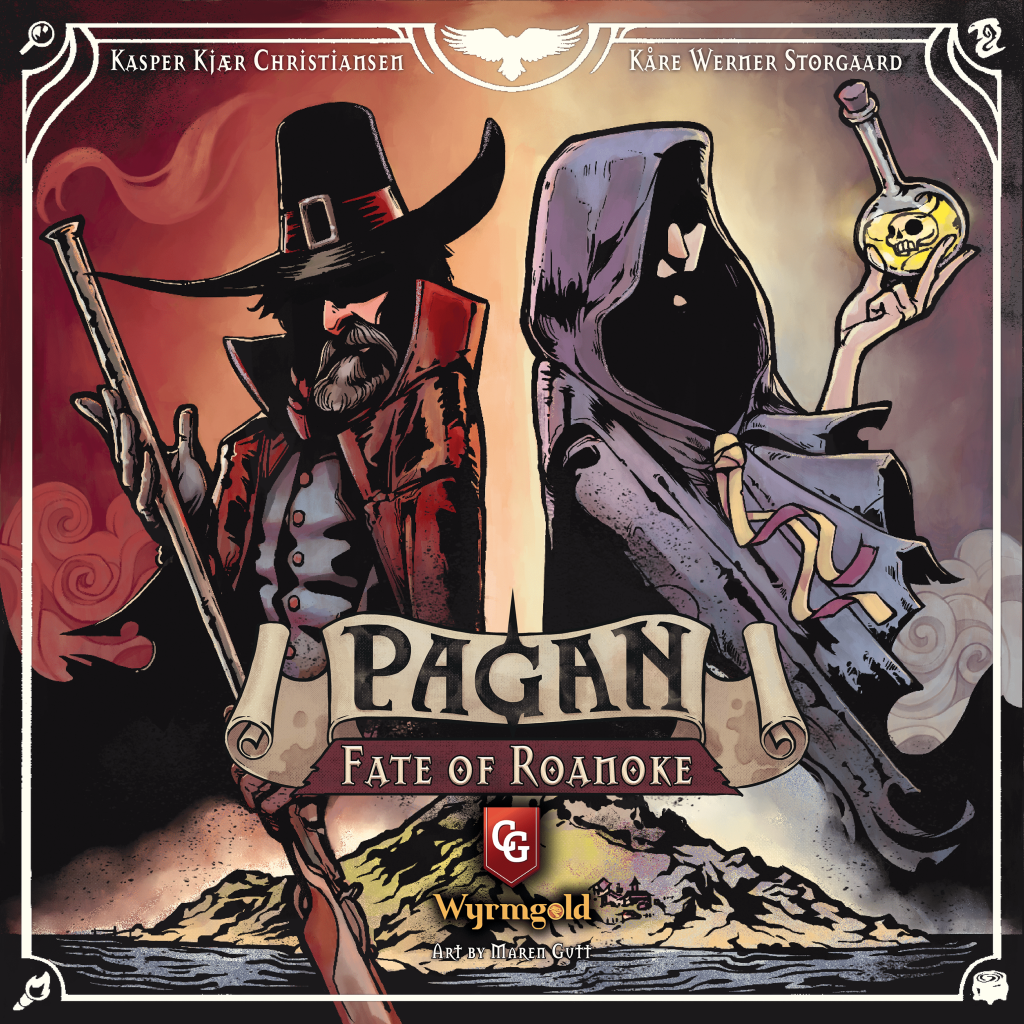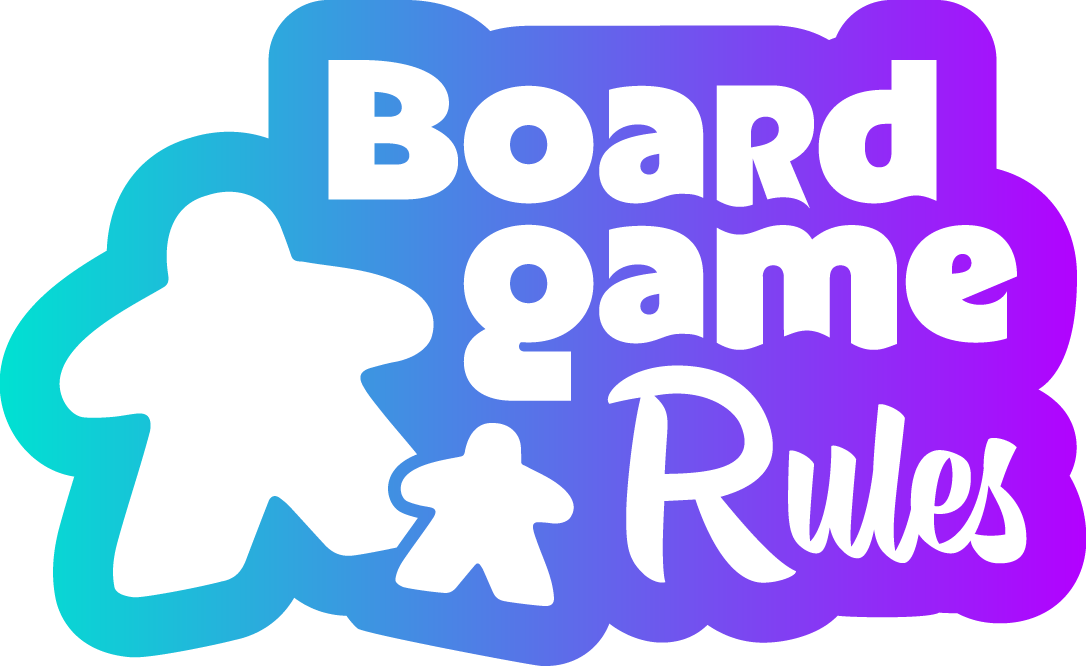Pagan: Fate of Roanoke
2022
Experience the suspense and strategy of Pagan: Fate of Roanoke. Assume the role of a witch or hunter in this award-winning card game, set in colonial America.
60
minutes
2 - 2
player(s)
12+
Medium Heavy


About the game
Welcome to one of the most intriguing and immersive board games out there – Pagan: Fate of Roanoke. This game is not just about strategies and moves. It’s about a compelling setting, a mysterious atmosphere, and a unique narrative that will draw you into the world of 16th-century colonists trying to survive and thrive in a new land.
Pagan: Fate of Roanoke is set in the year 1587, in the ill-fated Roanoke Colony. The colony, located in what is now Dare County, North Carolina, was the first English settlement in the New World. However, by 1590, all of its inhabitants had disappeared without a trace, giving rise to one of the most haunting mysteries in American history.
Read More
Setup and rules summary
Game components Unboxing the fun!
Pagan: Fate of Roanoke is an immersive and strategic board game that takes players back to the mysterious lost colony of Roanoke. The game includes various components, each with its distinct function and interaction within the game.
1. Game Board: The game board is the map of Roanoke Island, divided into various regions. Players move their game pieces across the board to perform different actions.
2. Player Tokens: There are four sets of player tokens, each set a different color to represent the four players. These tokens are used to keep track of players’ positions on the board.
3. Resource Cards: The game comes with a deck of resource cards. These cards represent various resources that players can gather during the game, such as food, wood, and stone. They are used for building structures and advancing in the game.
4. Fate Cards: Fate cards are drawn at the beginning of each turn and can bring good or bad fortune. These cards can alter the game, affecting players’ strategies and moves.
5. Building Cards: Building cards are used to construct structures on the game board. Each building card specifies the type of building, the resources required to construct it, and its benefits.
6. Dice: The game includes a set of dice used to resolve various game situations, from resource gathering to combat.
7. Rule Book: The rule book provides detailed explanations of the game rules, game setup, and gameplay. It’s crucial for understanding the game and resolving any disputes during play.
Each component of Pagan: Fate of Roanoke interacts in unique ways to create a complex and engaging gameplay experience. Players must manage their resources, build structures, navigate fate cards, and strategically move around the board to ensure their colony’s survival and ultimately solve the mystery of the lost colony of Roanoke.
Game setup Lay it out, line it up, let’s go
Pagan: Fate of Roanoke is an immersive board game that requires strategic planning and cunning to win. The game is set in the mysterious lost colony of Roanoke, where players take on the roles of colonists trying to survive. Here is a step-by-step guide on how to set up the game:
Step 1: Player Roles
- Choose Player Roles: Each player should select a character card. The roles available include the Colonist, the Elder, the Explorer, and the Shaman. Each role has unique abilities and skills that can be used throughout the game.
- Identify Player Tokens: Each player should then take the corresponding token for their chosen character.
Step 2: Board Placement
- Setup the Main Board: Place the main board in the center of the play area. This board represents the colony of Roanoke and the surrounding wilderness.
- Place Character Tokens: Each player places their character token on the starting space indicated on the main board.
Step 3: Initial Resources
- Resource Cards: Shuffle the resource cards and deal five to each player.
- Resource Tokens: Each player also receives three resource tokens of each type (food, wood, and stone).
- Special Items: Depending on the character chosen, each player may start with special items indicated on their character card.
Step 4: Random Elements
- Event Cards: Shuffle the event cards and place them face down next to the game board. These cards introduce random elements into the game, such as natural disasters or attacks from outsiders.
- Draw Initial Event: Draw the top card of the event deck and resolve its effects. This begins the game.
Remember, the goal of Pagan: Fate of Roanoke is to survive and build a thriving colony. Use your resources wisely, cooperate with other players, and adapt to the challenges posed by the event cards. Good luck!
Game flow Round and round we go
Pagan: Fate of Roanoke is a thrilling board game that requires strategic decision-making, cooperation, as well as a bit of luck. The game is divided into several rounds and phases, each with its own set of actions for the players to perform. Here’s a detailed breakdown of the game’s structure.
1. Setup Phase:
- Each player selects a character and takes the corresponding character card.
- All players place their character tokens on the starting space of the game board.
- Shuffle the fate deck and deal each player a hand of fate cards.
- Place the remaining fate cards and other game components (such as food, wood, and stone tokens) within easy reach of all players.
2. Action Phase:
- Starting with the first player and proceeding clockwise, each player takes their turn. During a turn, a player may perform two actions. Actions include moving, gathering resources, building structures, trading, or using a fate card.
- Players may perform the same action twice, but certain restrictions apply based on the character’s abilities and the current state of the game board.
3. Event Phase:
- After all players have taken their turns, the event phase begins.
- During this phase, a fate card is drawn from the top of the deck and its effects are applied. Events can be beneficial or detrimental, influencing resources, characters, or the game board itself.
4. Upkeep Phase:
- This is the final phase of a round. During the upkeep phase, players replenish their hands of fate cards, resolve any ongoing effects, and prepare for the next round.
- After the upkeep phase, a new round begins with the action phase. The game continues in this cycle until one player achieves the victory condition, or until the game ends due to a failure condition.
Note: The victory condition in Pagan: Fate of Roanoke typically involves building a certain number of structures or achieving a specific goal detailed on a character card. Failure conditions often involve the exhaustion of vital resources or the death of a character.
Players'turn One turn to rule them all
In the board game ‘Pagan: Fate of Roanoke’, each player’s turn is an essential part of the gameplay. During their turn, a player can perform a number of actions and make strategic choices that can affect the outcome of the game.
Actions:
- Draw Cards: The player begins their turn by drawing two cards from the deck, adding them to their hand. This action can provide players with opportunities to strategize and plan their next moves.
- Play Cards: After drawing cards, the player can then play a card from their hand. This action can be used to attack opponents, defend against attacks, or provide other strategic advantages. The effects of the card are resolved immediately.
- Activate Powers: Some cards in a player’s hand may have special powers that can be activated. This action can provide players with additional strategic options during their turn.
- End Turn: After a player has performed their actions, they end their turn by declaring it to the other players. It is then the next player’s turn.
Strategic Choices:
There are several strategic choices a player can make during their turn in ‘Pagan: Fate of Roanoke’.
- Card Selection: The choice of which cards to play can greatly affect the outcome of the game. Players need to carefully consider their options and choose the cards that will best serve their strategy.
- Power Activation: Deciding when to activate a card’s power can also be a significant strategic choice. Some powers may be more beneficial if used at specific times or in conjunction with other cards.
- Attack or Defence: Players need to decide whether to focus on attacking their opponents or defending against their attacks. This decision can depend on the current state of the game and the cards in a player’s hand.
By carefully considering their actions and strategic choices, players can influence the course of the game and increase their chances of winning ‘Pagan: Fate of Roanoke’.
End of the game All good games must come to an end
The game of ‘Pagan: Fate of Roanoke’ ends when either the Colony of Roanoke is fully settled or the ‘Time of Desperation’ card is drawn from the event deck. After one of these triggering events takes place, players will proceed with the final scoring to determine the winner of the game.
Victory Conditions:
The aim of ‘Pagan: Fate of Roanoke’ is to accumulate the highest number of Victory Points (VPs). The player with the most VPs at the end of the game is declared the winner. VPs can be gained through various means, such as:
- Settling the Colony: Players gain points for each settler they have in the colony, with bonus points awarded for the player with the most settlers.
- Event Cards: Players can gain points from completed event cards.
- Special Actions: Some special actions, when executed effectively, can result in gaining extra VPs.
- Demon Favors: Players can also gain points by gaining the favor of the demon, which can be achieved by successful rituals or offerings.
Pre-Final Scoring Actions:
Before the final scoring, players must perform a few steps:
- Complete any remaining actions on their turn. Any actions that can be executed and are beneficial for the final score should be taken.
- Resolve any remaining Event Cards. This may result in gaining or losing VPs.
- Perform any remaining rituals or offerings to increase the favor of the demon.
- Count the number of settlers in the colony. Each settler contributes to the final score, so make sure to count them accurately.
After these steps are performed, players proceed with the final scoring. All Victory Points are counted, including those from settler bonuses, event cards, special actions, and demon favors. The player with the highest total is declared the winner. In case of a tie, the player with the most settlers in the colony wins the game.
Scoring Did you outsmart your rivals?
Pagan: Fate of Roanoke uses an intricate scoring system to determine the winner. Scoring occurs at two phases: during the game and at the end of the game.
Scoring During the Game:
- Completing Missions: Players are awarded points each time they complete a mission. The number of points varies depending on the mission’s difficulty level. This ranges from 1 to 3 points.
- Building Structures: Players earn points for every structure they build. Each player earns 1 point for small structures, 2 points for medium-sized structures, and 3 points for large structures.
- Converting Followers: For every follower a player converts to their cause, they earn 1 point.
Scoring at the End of the Game:
- Remaining Resources: Players receive 1 point for every 3 unused resources they have at the end of the game.
- Unfinished Missions: Players lose 1 point for every mission they accepted but did not complete.
- Majority of Buildings: The player with the most buildings of each type (small, medium, large) earns bonus points. The player with the most small buildings receives 2 extra points, the player with the most medium buildings receives 3 extra points, and the player with the most large buildings receives 4 extra points.
After all points are tallied, the player with the highest total is the winner. In case of a tie, the following tie-breaking rules are applied:
- The player who completed the most missions wins.
- If still tied, the player with the most buildings wins.
- If still tied, the player with the most followers wins.
- If still tied, the player with the most remaining resources wins.
- If a tie still persists, the player who played last wins.
Particular Cases and Exceptions Wait… is that legal?
Pagan: Fate of Roanoke is a compelling board game that involves strategy, decision-making, and a bit of the unknown. While the basic rules are straightforward, there are a few rare or special rules, exceptions, and clarifying points that might be important for players to understand.
1. The ‘Fate’ Rule: In certain scenarios, a player might find themselves in possession of the ‘Fate’ card. This card holds a special rule that allows the player to reverse a game event or decision once during the game. It’s important to note that the ‘Fate’ card can only be used once and must be returned to the deck after use.
2. The ‘Roanoke’ Exception: Unlike other locations on the game board, Roanoke has an exception rule. If a player lands on Roanoke, they are not allowed to engage in the usual actions such as building or recruiting. Instead, they must draw a ‘Roanoke’ card and follow the instructions.
3. Rule Clarification for ‘Pagan’ Cards: The Pagan cards are a powerful part of the game. However, a key rule clarification is that these cards are not allowed to be used in the first two rounds of the game. This is to ensure fair play and give all players an equal start.
4. Special Rule for ‘King’s Orders’: The ‘King’s Orders’ cards are special cards that can greatly influence the game. A player can have more than one ‘King’s Order’ card, but they can only use one per turn. The card’s effect is immediate and must be resolved before the player can proceed with their turn.
5. The ‘Disease’ Exception: The ‘Disease’ cards represent the various plagues and illnesses that the settlers faced. When a player draws a ‘Disease’ card, they must immediately lose one settler from their pool. However, if a player has a ‘Medicine’ card, they can use it to negate the effects of the ‘Disease’ card.
6. Rule Clarification for ‘Trading’: Players can trade resources and cards with each other during their turn. However, they cannot trade ‘Fate’, ‘Disease’, or ‘King’s Orders’ cards. Also, a player cannot trade away all of their settlers.
- Remember: The aim of the game is not just about amassing resources and settlers, but also about strategic decision-making and interaction with other players. Understanding these special rules and exceptions can greatly enhance the gaming experience.
Tips and tricks Play smarter, not harder!
Pagan: Fate of Roanoke is a thrilling board game that requires strategic thinking and clever decision-making. Here are some advanced strategies, beginner tips, common mistakes to avoid, and ways to optimize gameplay.
Advanced Strategies:
- Master the Art of Bluffing: Pagan: Fate of Roanoke is a game where bluffing can give you a significant edge. Practice deceiving your opponents about your intentions to keep them off guard.
- Manage Resources Effectively: Ensure you are not overusing your resources early in the game. Instead, try to accumulate and save them for the end game to secure a win.
- Understand Each Character’s Abilities: Each character in Pagan: Fate of Roanoke has unique abilities. Understanding each one’s strengths and weaknesses can help you formulate a winning strategy.
Beginner Tips:
- Learn the Rules Thoroughly: Before playing, make sure you understand all the rules. This can prevent confusion during gameplay and help you make more informed decisions.
- Start with Easy Characters: Some characters are easier to play than others. Start with these to gain familiarity with the game before moving on to more complex characters.
- Practice Makes Perfect: Don’t expect to win right away. It may take several rounds to get the hang of Pagan: Fate of Roanoke. Practice regularly to improve your skills.
Common Mistakes to Avoid:
- Avoid Neglecting Defense: While it’s tempting to focus on attack, don’t neglect your defense. Balancing both aspects of gameplay is crucial to success.
- Avoid Hoarding Too Many Cards: Holding onto too many cards can limit your options. Remember to use your cards strategically and not just accumulate them.
- Don’t Ignore Your Opponents: Pay attention to what your opponents are doing. Anticipating their moves can give you an advantage.
Ways to Optimize Gameplay:
- Use Your Cards Wisely: Instead of using cards as soon as you get them, consider saving them for when they can make the most impact.
- Make Use of Alliances: Forming alliances with other players can be a powerful strategy. However, remember that these alliances can be broken, so trust wisely.
- Constantly Evaluate Your Strategy: Don’t stick to a failing strategy. Instead, constantly evaluate your gameplay and make necessary changes based on the situation.
